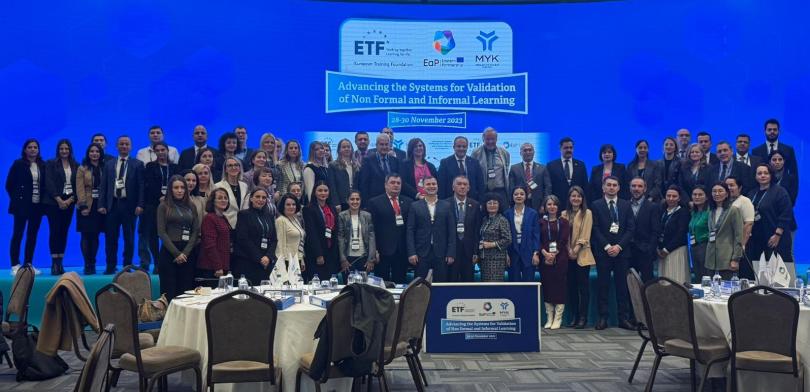
Ground-breaking international meeting on validation of non-formal and informal learning
Hosted by the European Training Foundation and the Turkish Vocational Qualifications Authority in Ankara
Ensuring that people are able to make greater use of skills and abilities acquired outside of formal educational environments will be crucial in the coming years, delegates at the ETF’s first broad international event on validation of non-formal and informal learning (VNFIL) in Ankara, heard Tuesday, 28 November.
As new professions emerge and the pace of technological change increases along with new demands of the green and digital transition, ensuring that no human capital skills go to waste is now an economic priority globally, Professor Dr Mustafa Necmi, President of the Turkish Vocational Qualifications Authority told delegates from across the EU’s Eastern Partnership region, Central Asia and the Western Balkans.
“There are new professions that are emerging and we have to react accordingly,” he said, adding that according to the World Economic Forum, over the next five years, 23% of jobs worldwide will change.
“Without developing human capacity, we cannot do anything; it is important to invest in human resources – and that means training. A qualified workforce is important. Assessment and validation are important in all sectors – from nurses to doctors, from constructors to artisans.”
Noting that formal education and training – until around the age of 20 – only equips people with “8 to 10%” of the information they will acquire during their lifetime, it was essential to capture all opportunities to recognise skills, however they were acquired, Prof. Necmi said.
“One of the most important reforms of the EU is validation and certification of prior learning and creating mechanisms for that.”
Türkiye’s work in this area – where 270 testing centres have been established since the Vocational Qualifications Authority was established in 2006 – means that it represents a natural focus for peer learning events in validation.
The country has issued more than 2.5 million certificates acknowledging and making visible the informally acquired skills of its workforce.
“Validation is one of the pillars of lifelong learning,” Manuela Prina, ETF Head of Skills Identification and Development Unit, noted. “It recognises that learning happens beyond the classroom, is important for career orientation, and empowers vulnerable adult job-seekers or those wishing to change careers.”
Non-formal refers to skills acquired in settings where some kind of certification is given – for example, a privately run diving course. Informal refers to skills acquired through wider life experience – for example, building or engineering skills passed down through family or friends of an individual.
The aim of the Ankara three-day conference, which included visits to Turkish qualification validation centres, was to “share good practice – Türkiye has advanced a lot in this area – and to establish a network of practitioners who focus on validation,” Manuela added.
“The possibility of peer exchange to learn from each other is very important.”
Validation was something that countries needed to work together on to increase labour mobility and meet labour market demands.
Sofia Doskarova, a policy officer at the European Commission’s Directorate-General for Employment, Social Affairs and Inclusion, speaking online from Brussels, told participants that validation was a key pillar of the EU’s drive to improve skills and the bloc’s knowledge economy.
Statistics told a story supporting wider opportunities to recognise skills: last year there were 38 occupations across the EU that were classed as having shortages. As many as three-quarters of small and medium-sized enterprises reported that they faced skills shortages this year.
And yet, adult learning remains stubbornly low: just 37% of people participate in skills upgrading after leaving school or college. And with 94% of jobs now requiring digital skills, but only 54% of adults in the EU possessing basic digital skills, the needs for training – and validation of prior learning – were obvious.
“The key challenge is to integrate a validation system into the adult learning system as a whole,” Doskarova said. “There is a lack of take up by both adults and employers.”
The problem was compounded where “uncertainty about the recognition of learning outcomes further reduces incentives for training,” she added.
Maria Rosenstock, ETF Human Capital Development Expert and Coordinator for Qualifications, said that the ETF had been working on validation since 2012 and that validation arrangements had been put in place in many partner countries since 2018, with recognition often linked to national qualification frameworks, following the EU model.
There had been “quite a few policies and pilots” but no major developments in partner countries apart from Türkiye and Kazakhstan, she said.
Lyazat Sonayeva, of Kazakhstan’s “Atameken” National Chamber of Entrepreneurs, described how the private sector had driven the development of a national validation network that now numbered 25 centres, where more than 33,000 recognised qualification certificates had been issued over the past 10 years.
By starting work with priority sectors that included oil and gas, mining and metallurgy, and tourism, qualification and validation systems based on international standards had been established, she said.
In another online presentation, Ernesto Villalba-Garcia, an expert at Cedefop (European Centre for the Development of Vocational Training) said that preliminary results from a study on the availability and applicability of validation across 32 countries in Europe (EU, EFTA and 11 ETF partner countries) that have systems in place, showed that in 50% of the countries full formal qualifications could be obtained through validation pathways; in 70% partial credits, modules and exemptions for formal qualifications were possible.
Did you like this article? If you would like to be notified when new content like this is published, subscribe to receive our email alerts.